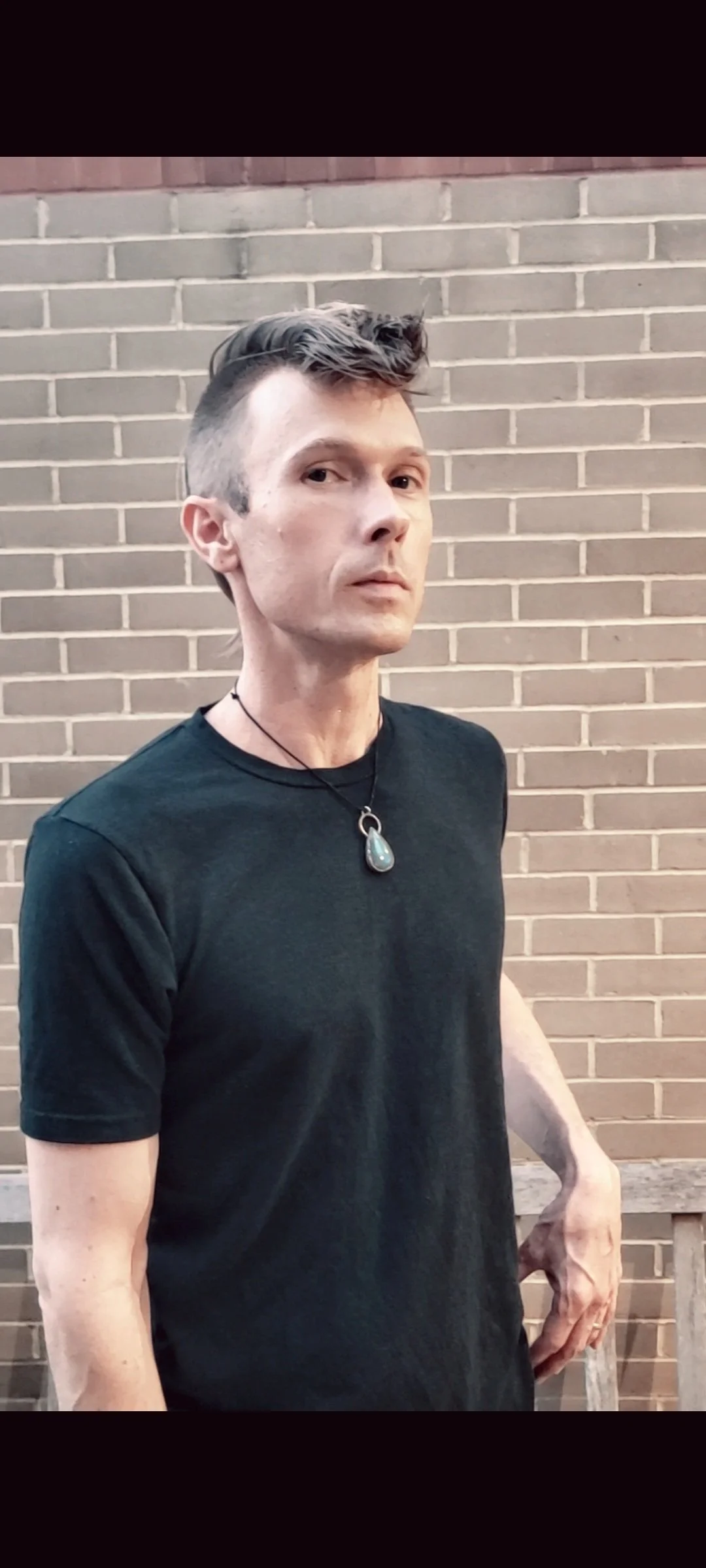Adeem the Artist, Harley Chapeau
Doors 7PM / Show 8PM
Seated Show
$12ADV / $15DOS
As they began working on a new batch of songs, Adeem the Artist was busy thinking about the way a lifetime of experiences can pile up in a person’s brain. “Traumatic events and warm events leave psychological imprints — there’s this pattern to it,” says the Knoxville, Tennessee-based performer. “Different moments and different impressions throughout our lives will ripple out and demand repeated engagement. They play out in little holidays that we celebrate over and over.”
Those patterns and markers of time are a crucial thread running through Adeem’s new album Anniversary, due out May 3, 2024 via Thirty Tigers. Recorded live to tape over five days at The Butcher Shop (Nashville, TN) and produced by Butch Walker (Taylor Swift, Frank Turner) with the master musicianship of Megan Coleman (Jenny Lewis and Allison Russell), Nelson Williams (Jake Blount), Ellen Angelico (Wheeler Walker Jr.), Jessye DeSilva, Aaron Lee Tasjan, and Katie Pruitt, the 12-song collection is a stunning statement of empathy, humor, and deep introspection.
The groundwork for Anniversary began in earnest after Adeem met Walker for coffee, having caught the producer’s attention with some spirited shitposting on social media. Adeem had been a fan since Walker’s solo album Sycamore Meadows, which they heard while living in the Syracuse, New York, area after high school. “I was absolutely obsessed,” they say. “I was a Christian worship pastor and having all these doubts. The religious questioning and soul searching Butch was doing on that record was so important for me.”
Walker’s ability to blend sounds from classic to contemporary, commercial to experimental, gives Adeem license to play with a range of musical styles on Anniversary, while still remaining tethered to country and roots music. Fittingly, Anniversary also arrives on the date of Adeem’s marriage to their spouse Hannah, bringing with it a heightened sense of intimacy and urgency from a songwriter whose work is characterized by fearless, incisive lyric writing.
“This one feels a lot more personal and earnest — a lot of it is very close to the chest,” Adeem says. “This record is a marker as well as a collection of individual markers. I’m saying, ‘This is who I am as an artist and this is the world I want to try to help create.’”
Album opener “There We Are” weds a 13-year-old poem written for Hannah to an arrangement that sounds like indie-rock Ennio Morricone and recalls vivid imagery from early in their romance. “We went on a run of tour dates in my dad’s old Pontiac,” Adeem says. “I put it to music like a month and a half before we did the record with Butch and Hannah was like, ‘That’s it. That’s gotta go on there.’”
“There We Are” is immediately followed by “Nancy,” a surging rocker that looks at our shifting understanding of mental illness. “Hey, you know this world is crazy/It ain’t you and me, baby,” they sing, pointing a finger at a society that emphasizes the most brutal forms of competition without offering any aid to people ill-equipped to function in that environment. “It’s not so much that people are increasingly mentally ill as it is that people are forced to fit in a society that’s so inhuman and unlivable that it produces these results,” Adeem says. “What I wanted to do was normalize the idea of having a protagonist in a song who has borderline personality disorder, but who also isn’t exactly virtuous or heroic.”
Adeem looks inward in the shimmering folk-rock tune “Part & Parcel,” seeing how their “timelines interweave, creating patterns” that are laid out across their life, from childhood to marriage and childbirth. By “One Night Stand,” they’ve slipped into radio country clothing for a blushing ode to a guy who comes home for a hookup and stays for life. “It’s very Nineties camp country,” Adeem says. A few songs later, “Wounded Astronaut” employs a John Prine-style acoustic guitar melody to wrestle with the outcomes of misogynistic societal norms.
Adeem also looks at parenthood as another important personal marker on Anniversary. “Carry You Down” makes a promise to be a sturdy presence, adding some lovely horn shadings in the middle section. “Rotations,” which was almost the album’s title, presents a tender take on aging and the passage of knowledge that plays like a lullaby until a muted trumpet solo turns it into something magical and cosmic — an extra infusion of “woo-woo juice,” if you like. “It felt necessary to color in the caricature of Adeem the Artist that people have become acquainted with,” they say. “My kid was born on my Saturn return. Our next Saturn return, we’ll be synced up. When I turn 60 and go into my second Saturn return, my kid will be going through their first one. There’s something interesting to me about that sense of timing.”
Adeem’s incorporation of brass into their sound goes full blast in “Socialite Blues,” which mixes a Piedmont progression with rowdy second line horns out of New Orleans. Lyrically, it was written as an ode to Hannah, but it taps into the rich tradition of country and blues that mingled in the region of Adeem’s ancestors; drawing influence from Blind Boy Fuller & Brownie McGhee. “So many blues songs act as lamentations,” Adeem says, “and I thought it could be fun to give language to Hannie’s need to go out less now that life demands so much extroversion of us.”
The passionate activist side that has been a hallmark of Adeem’s work from the beginning is still very much present on Anniversary. In the heart-pounding anthem “Nightmare,” featuring Katie Pruitt, there’s a palpable sense of outrage and defiance over the wave of anti-trans legislation in this country. Adeem, who is non-binary and pansexual, flips the “don’t tread on me” sloganeering by right-wing types on its head by posing a hypothetical about their beliefs. “Suppose some senators decide your worship is obscene/All ages Sunday service is suddenly a felony,” they ask in one verse. “I used that language to be like, ‘Can you see how you are, in a real and tangible way, actually doing the thing you’re so afraid of somebody doing to you?’” they say.
In the uptempo, guitar-driven “Plot of Land,” that defiance turns downright joyful as Adeem dreams of a future where it’s possible to buy a little house with blueberry bushes out front. “It’s what so many people are looking for, to buy out of the second-class citizen loan system we’re born into and live a life of consistency and joy,” they say. “So many people are just living in survival mode.”
The album ends with a devastating one-two punch of “Night Sweats” and “White Mule, Black Man,” showing Adeem’s deep reserves of empathy and insight into how human patterns play out on a massive scale. “Night Sweats” was penned about observing nightly images of war on TV when the US invaded Iraq in the early 2000s, but could’ve been written yesterday. “It’s about seeing the lifeless body of a child and the effect that has on you psychologically and the way you perceive good and bad and right and wrong and justice,” Adeem says. “People think it’s about what’s going on right now, but this just keeps happening over and over again.”
“White Mule, Black Man” packs a century of Knoxville history in three verses, from a superstitious belief in a curse to brutal, unjust killings of two Black men, one of whom was a high school student, a hundred years apart. In both cases, their killers didn’t even pause to hear their last words, leading to a conclusion that will stick with you long after the record is over. “I’m drawing a connection between these two men’s pleas to be heard and how all these people keep saying, ‘I don’t know, I guess we’re cursed because of that mule,’” Adeem says. “Obliviousness is akin to criminally negligent here.”
Delivering impossibly heavy and deep subject matter in an empathetic and humane way, that’s the beauty of Anniversary— Adeem always digs deeper to find the complicated truths that are contained within.
Harley Chapeau has been performing on street corners and plazas since 2009.
The Art of Reappearing is an intimate, honest magical experience for adults that invites you to embrace the simple and the extraordinary. This autobiographical theatrical work explores themes of family, purpose, chance, and synchronicity through story and illusion.


